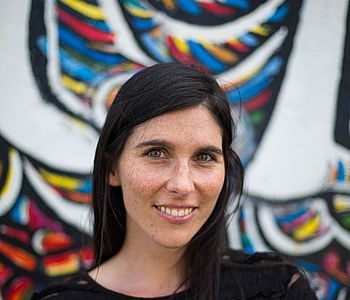Dr Ophélie Véron | Assoziierte Forscherin
Ehemaliges Mitglied
Mutterinstitut
:
Technische Universität
|
Position
:
Marie Skłodowska-Curie Fellow
|
Fachbereich
:
Geographie
|
Biographie
Ophélie Véron is a Leverhulme Early Career Research Fellow at the University of Sheffield. A former student of the École Normale Supérieure of Paris, she did an MA in Geography at the Sorbonne University (2007) and an MSc in Russian and East European Studies at the University of Oxford (2008). She also worked as an associate lecturer at the Paris Institute of Political Studies. She obtained her PhD degree in Geography at University College London in 2015. Her doctoral research examined issues of power and resistance in ‘divided cities’. Following the completion of her PhD, she took a year outside formal academic employment and worked in the non-governmental sector in France. Ophélie then secured a position as a postdoctoral fellow at Université Catholique de Louvain in Belgium in order to pursue her work on urban contestation and social movements. A focus on the vegan movement offered her the opportunity to engage in the study of alternative food networks. Ophélie started her fellowship at the University of Sheffield in November 2018. She is affiliated to the CMB since October 2019. Her current research project engages with the critical geographies of race, class and gender in grassroots food initiatives.
Is the Alternative City a Just City?
From guerrilla gardening to freeganism, via community gardens and kitchens, everyday alternative practices challenge conventional food cultivation methods, preparation, distribution and consumption. Embodying more than just a desire to eat "healthier" or "green" diets, these activities follow a critical perspective on sustainability and social justice, and prefigure the kind of society they want to bring about, often based on horizontality, self-management and alter-globalisation ideals. They have therefore informed the emergence of autonomist perspectives in Geography. Challenging the neoliberal motto "There Is No Alternative", they contest consumption-based notions of "Voting with your wallet" and are praised for their emancipatory potential and legitimated through positive narratives.
However, assumptions of the alternative city are not inherently synonymous with the just city. Scholars have started to critically examine alternative food movements (AFM), illustrating how even the most well-intentioned practices may support broader social and political inequalities. The aim of this research project is to explore whether the alternative city is a just city. While grassroots initiatives are usually presented as relevant alternatives to environmental, food and governance crises, their good intentions do not always directly translate in social justice. By empirically focusing on AFM in urban space, the project seeks to critically examine how they relate to broader social and political inequalities. It examines their role in perpetuating, reinforcing or challenging systems of oppression in urban space, such as classism and racism. It traces how, despite apparently operating outside the free market economy, alternative practices may reflect power asymmetries among urban communities and generate social exclusion by discursively and practically excluding low-income communities and/or communities of colour – thereby taking part in processes of gentrification and socio-spatial segregation, which are indicative of the current neoliberal restructuration of urban space. Conversely, the project also examines how similar initiatives may promote inclusive practices and work towards social justice. By analysing efforts to achieve a more inclusive local food system from the ground up, it explores how cities have the potential to become more environmentally sustainable and socially just. Drawing on recent calls to fill an important omission located at the nexus of food, environment and inequality, this research aims to tie the food justice movement not only to environmental justice but also to "just sustainability".